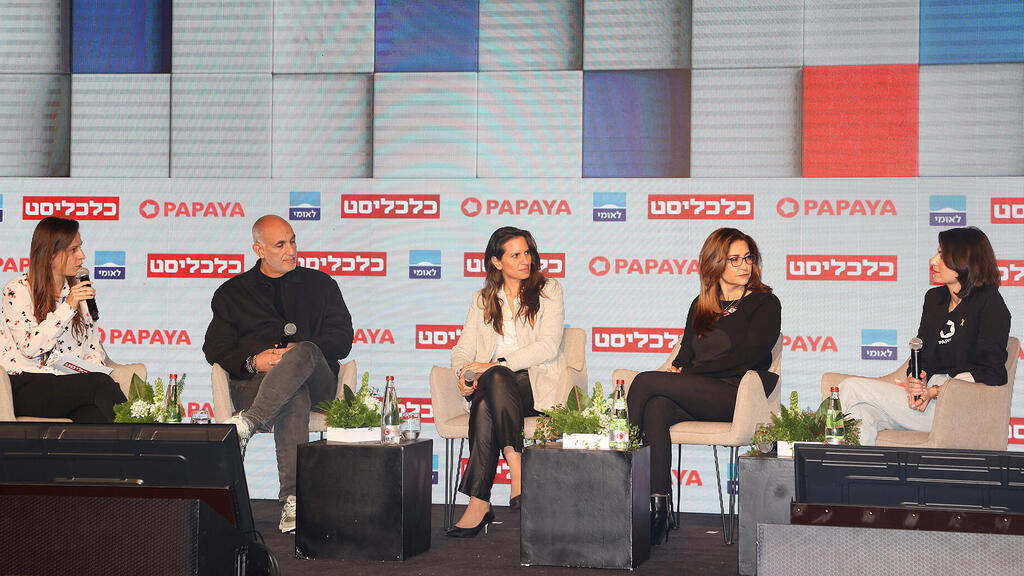
Tech TLV
"October 7th came without a manual, we had to be an island of stability for our employees"
In a panel entitled "HR at a time of war" at Calcalist's Tech TLV conference . Bella Bangayev, Director of Talent Acquisition at PAPAYA, said each reservist who returns to work is brought back in a gradual process that suits them. Ronni Zehavi, co-founder and CEO of HiBob, said, "In my opinion there will be significant waves of layoffs in Israel." Other panel participants were Rinat Zilberstein, VP R&D at AT&T, GM of Israel R&D Center, and Avivit Klein, VP of HR at Bank Leumi
"I think there will be significant waves of layoffs in Israel," said Ronni Zehavi, co-founder and CEO of HiBob at the panel entitled "HR at a time of war" held as part of Calcalist's Tech TLV conference held in collaboration with PAPAYA and Bank Leumi. He also added that in his estimation "the waves of layoffs that have been postponed to date will be mainly in companies that failed to raise new capital or that their sales are faltering." Rinat Zilberstein, VP R&D at AT&T, GM of Israel R&D Center, Avivit Klein, VP of HR, Bank Leumi, and Bella Bangayev, Director of Talent Acquisition at PAPAYA, also participated in the panel.
What are the first steps you took following the events of October 7?
Bangayev: "The events of October 7 caught us during a period of growth - we recruited over 100 employees. The events came without an instruction manual, we had to come to our senses quickly and create an island of stability for our employees. On a personal level, our employees experienced loss and we are here for them. Since the beginning of the war, we have continued to be in contact with them and their family members and provide them with flexibility at work along with support in various areas. We have established an anonymous support line, providing support for parents including babysitting services."
Under the management of AT&T in Israel are also 600 people who work in the U.S. How do you deal with the workers from abroad?
"We realized that the needs are very individual, there is no magic solution and we need to give everyone a hug and a response for all their needs,” said Zilberstein. “We had an employee in Sderot who needed something specific, so we provided it. There was also a combat group among our workers for whom this is the first war in which they did not participate and did not know what to do so we organized a control center which takes care of all the needs of soldiers at home. We had employees who worked 200% in an attempt to lose themselves in work," said Zilberstein.
"The workers abroad is a completely different story and we had a dilemma how they see and experience the situation. We decided to convene all 600 employees and told them what happened on October 7th and this created tremendous support for Israel."
HiBob works with 3,900 companies abroad. What reactions did you receive from customers at the beginning of the war? Did you prepare the employees for somewhat less sympathetic reactions?
"We have 3,900 customers and many partners,” Zehavi explained. “The response we received in the first few days was extraordinary in terms of empathy and the offer of help, including CEOs of competing companies from abroad. It was exciting to see their reaction, we only lost one customer due to the war and it had nothing to do with the business aspect. It was very challenging for the employees because this is a global company and having a company in Israel does not mean that its operations can be harmed."
Related articles:
A company with 8,000 employees may very likely encounter many different situations - murdered family members, civilians, soldiers, reservists who return after three months. What do you learn from such a period?
"We are an essential organization that requires business continuity and a significant part of the economy that must provide services at all times," said Klein, "That morning of October 7 we realized that the world is changing and we must focus on two aspects - how do customers not get harmed and how do we take care of our employees. We are an organization that allows flexibility and the more important side was to understand that this is a war and understand that many people are being called up for reserve service and how do you manage the workforce so that work is not harmed and how do you work from home? The coronavirus experience helped us a lot, we know how to provide services from home. There were those who could not work from home because they were evacuated. We gave the employees a week in a hotel to get organized. We made sure to provide them with resilience and support."
How do you receive workers who have returned from the war?
According to Bangayev, "every reservist who returns to work at PAPAYA, is brought back in a gradual process that suits them personally with the goal of returning to a good and comfortable work routine after a long period away."